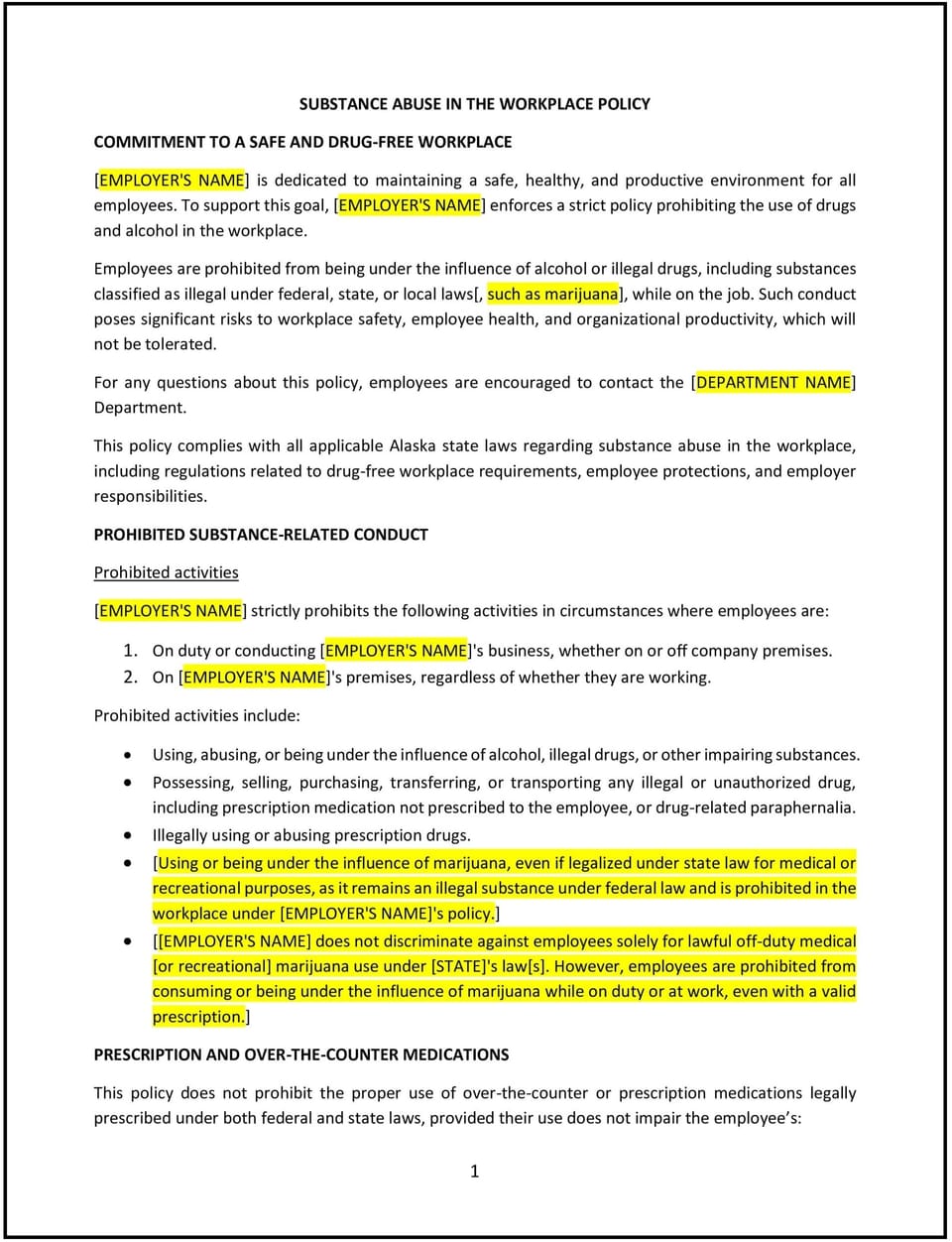Substance abuse in the workplace policy (Alaska): Free template

Substance abuse in the workplace policy (Alaska)
In Alaska, a substance abuse in the workplace policy provides clear guidelines for addressing the use, possession, or influence of drugs and alcohol in the workplace. This policy ensures a safe and productive environment by outlining expectations, procedures for addressing violations, and resources for employees seeking help. By implementing this policy, businesses can reduce safety risks, support compliance with state and federal laws, and promote employee well-being.
How to use this substance abuse in the workplace policy (Alaska)
- Define prohibited behaviors: Clearly outline behaviors that are not permitted, such as using, possessing, or being under the influence of drugs or alcohol during work hours.
- Include testing protocols: Specify when and how drug or alcohol testing may be conducted, such as pre-employment, post-incident, or random testing, in compliance with legal standards.
- Provide reporting procedures: Outline steps for employees to report suspected substance abuse in the workplace, ensuring confidentiality and non-retaliation.
- Offer support resources: Include information on employee assistance programs (EAPs) or other resources for employees seeking help with substance abuse issues.
- Emphasize consequences: Clearly state the potential disciplinary actions for violations, such as suspension, mandatory rehabilitation, or termination.
Benefits of using a substance abuse in the workplace policy (Alaska)
A substance abuse policy provides several advantages for businesses in Alaska. Here’s how it helps:
- Ensures workplace safety: Reduces risks associated with impaired judgment or behavior in safety-sensitive roles.
- Supports compliance: Aligns with Alaska’s drug-free workplace regulations and federal requirements for certain industries.
- Promotes employee well-being: Encourages employees to seek help through support programs and resources.
- Enhances productivity: Minimizes disruptions caused by substance abuse and ensures a focus on work responsibilities.
- Protects the company: Reduces liability risks by maintaining a clear and enforceable policy.
Tips for using a substance abuse in the workplace policy (Alaska)
- Address industry-specific needs: Tailor the policy for industries like construction, fishing, or aviation, where safety is paramount.
- Include legal compliance: Ensure the policy adheres to Alaska state laws and federal regulations regarding drug testing and employee rights.
- Train managers: Provide training on identifying signs of substance abuse and handling situations in accordance with the policy.
- Foster a supportive culture: Emphasize the availability of support programs and resources to encourage employees to seek help proactively.
- Update regularly: Revise the policy to reflect changes in workplace laws, industry standards, or workforce needs.
Q: What behaviors are prohibited under this policy?
A: The policy prohibits using, possessing, or being under the influence of drugs or alcohol during work hours, on company premises, or while conducting company business.
Q: How can businesses ensure compliance with Alaska’s drug-free workplace laws?
A: Regularly review state and federal regulations, include compliant testing protocols, and document all incidents and policy enforcement actions.
Q: What resources can businesses offer to employees with substance abuse issues?
A: Businesses can provide access to employee assistance programs (EAPs), counseling services, or rehabilitation programs to support employees.
Q: When can drug or alcohol testing be conducted under this policy?
A: Testing may occur during pre-employment screening, post-incident investigations, random checks for safety-sensitive roles, or when reasonable suspicion arises.
Q: How often should this policy be reviewed?
A: Review the policy annually or whenever changes occur in laws, workplace practices, or industry standards.
This article contains general legal information and does not contain legal advice. Cobrief is not a law firm or a substitute for an attorney or law firm. The law is complex and changes often. For legal advice, please ask a lawyer.


